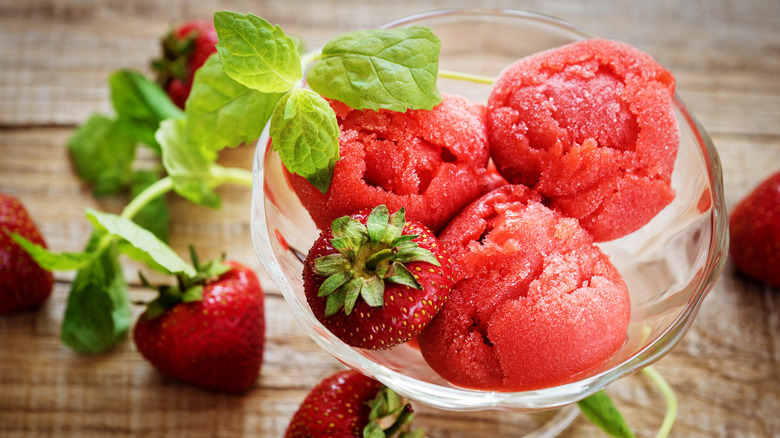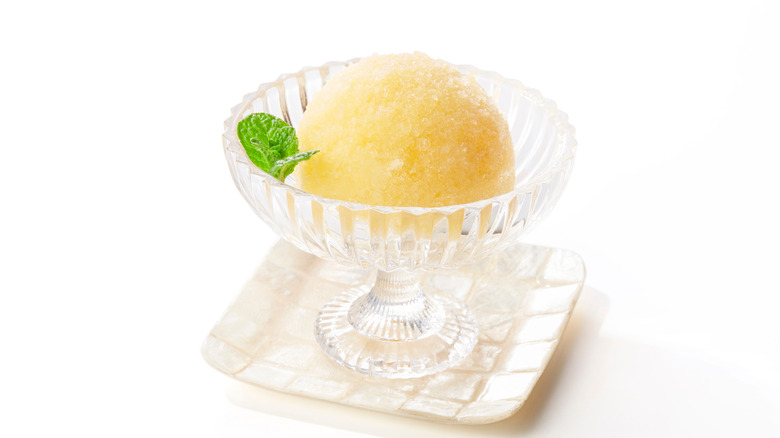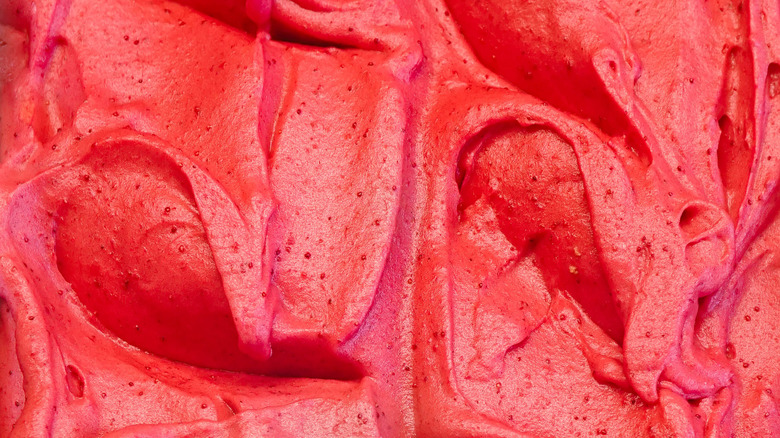Sherbet Vs. Sorbet: What's The Difference?
Whether sorbet, sherbet (sometimes mispronounced sherbert), ice cream, frozen yogurt, or gelato – as well as offshoots like semifreddo, granita, or snow cones — the pleasure that comes with enjoying an icy-cold, refreshing treat is a culinary experience like no other. If you've ever been confused between what differentiates sorbet and sherbet, though, you are certainly not alone.
The primary distinction is rather simple: dairy. The other variations (texture, consistency, flavor) are all a direct result of the presence, or lack thereof, of dairy products and eggs, as noted by Taste of Home. Of course, each product is delicious and always a welcome treat, but if you are eschewing dairy, or if you're sensitive to lactose, knowing the difference between these confectionary delights can be incredibly important. Beyond that, there are subtle changes between each which further influence the final product.
Read ahead to learn more about sorbet vs. sherbet.
What is sorbet?
Sorbet is more fruit-forward — common flavors include mango, raspberry, or lemon — and contains no dairy. Sorbet is an excellent option for anyone who is vegan or eschewing dairy product. It is typically no more than merely frozen fruit puree or juice combined with some sweetener. Food & Wine notes that sorbet is said to have originated by the Roman Emperor Nero, "who demanded buckets of snow be passed by hand from the tops of mountains to his banquet hall where the snow was then mixed with honey and wine." Pure Wow notes that some sorbets also may contain herbs, spices, seasonings, or even alcohol to further spruce up the flavor.
While most sweet treats are known as desserts or snacks, sorbet has a separate function. As Master Class notes, more neutrally-flavored sorbet can also act as a palate cleanser between courses, as opposed to a dessert or sweet treat. It was often served at high-end, fine-dining restaurants, on holidays, or at any sort of formal banquet event setting, such as a wedding.
What is sherbet?
In contrast, sherbet contains some dairy, but not nearly as much as gelato or ice cream, which is also thicker, richer, and much creamier. Sherbet has more of a creamy texture than sorbet, however — almost a midpoint between sorbet and ice cream, like the iconic raspberry sherbet. Daily Sabah notes that sherbet originated as a beverage and a means of preserving fruit prior to refrigeration — fruits would often be dried or turned into a syrup, which in turn could be made into sherbet.
According to Food & Wine, sherbet was created during the Ottoman Empire, when Alexander the Great often "served it as a sweet drink made from fruit and flower petals." It is even said that in the 1500s, Ottoman Emperor Suleiman the Magnificent would use different colors of sherbet to communicate if an advisor would be executed — red meant the advisor would be killed, whereas white sorbet meant that the advisor would live.
Some sherbets are also excellent inclusions in smoothies or milkshakes. Pure Wow also notes that sherbet is said to contain 1-2% milkfat, while sorbet has 0%, and ice cream has about 10%. Of course, this also affects the flavor, mouthfeel, and consistency of the products; sherbet is smoother and creamier, while sorbet can be icy.
What are the health benefits?
Reader's Digest reports that from a calorie standpoint, sorbet and sherbet are interchangeable, and sometimes contain even more calories than ice cream. Sorbet is typically entirely vegan, however, so it is definitely a great dessert option for those with any aversion to animal products such as dairy and eggs. Daily Sabah lists a myriad of sherbet health benefits, ranging from weight loss and lower cholesterol to skin smoothing, regulating blood pressure, and promoting thyroid health. Of course, sherbet and sorbet will also boast the vitamins and nutrients that are inherent in the fruits, spices, herbs, or flavorings used to make them. Some sorbets or sherbets may also be served with toppings or mix-ins, which can also improve to improve the health benefits already present in the refreshing confection.
No matter if you're indulging in sorbet or sherbet, you're bound to enjoy. And the next time a friend ponders the distinction between the two, you'll be able to answer with certainty.



